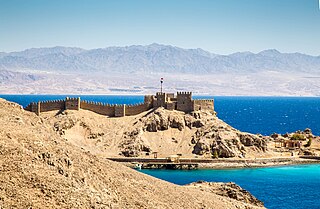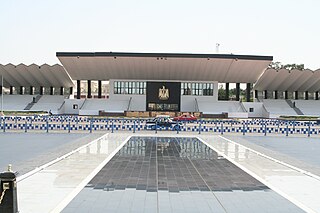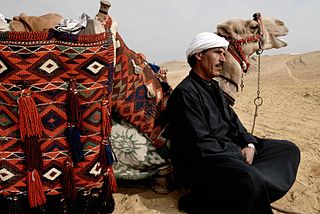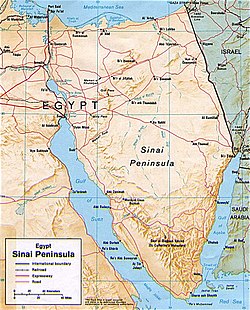
The Sinai Peninsula, or simply Sinai, is a peninsula in Egypt, and the only part of the country located in Asia. It is between the Mediterranean Sea to the north and the Red Sea to the south, and is a land bridge between Asia and Africa. Sinai has a land area of about 60,000 km2 (23,000 sq mi) and a population of approximately 600,000 people. Administratively, the vast majority of the area of the Sinai Peninsula is divided into two governorates: the South Sinai Governorate and the North Sinai Governorate. Three other governorates span the Suez Canal, crossing into African Egypt: Suez Governorate on the southern end of the Suez Canal, Ismailia Governorate in the center, and Port Said Governorate in the north.

Taba is an Egyptian town near the northern tip of the Gulf of Aqaba. Taba is the location of Egypt's busiest border crossing with neighboring Eilat, Israel. It is the northernmost resort of Egypt's Red Sea Riviera.

Sharm El Sheikh is an Egyptian city on the southern tip of the Sinai Peninsula, in South Sinai Governorate, on the coastal strip along the Red Sea. Its population is approximately 73,000 as of 2023. Sharm El Sheikh is the administrative hub of Egypt's South Sinai Governorate, which includes the smaller coastal towns of Dahab and Nuweiba as well as the mountainous interior, St. Catherine and Mount Sinai. The city and holiday resort is a significant centre for tourism in Egypt, while also attracting many international conferences and diplomatic meetings. Sharm El Sheikh is one of the Asian cities of Egypt.

South Sinai Governorate is the least populated governorate of Egypt. It is located in the east of the country, encompassing the southern half of the Sinai Peninsula. Saint Catherine's Monastery, an Eastern Orthodox Church monastery and UNESCO World Heritage Site of world renown, is located in the central part of the governorate.
The April 2005 attacks were three related incidents that took place in the city of Cairo, Egypt, on 7 April and 30 April 2005. While the first killed three bystanders, the latter two incidents are generally considered to have been minor, in that they caused no loss of life other than those of the perpetrators and appear not to have been planned in advance. Neither sophisticated methods nor sophisticated materials were used in the incidents, and the Egyptian authorities have consistently described the attacks as "primitive".
The 2005 Sharm El Sheikh bombings were committed by Islamist group Abdullah Azzam Brigades on 23 July 2005 in the Egyptian resort city of Sharm El Sheikh, at the southern tip of the Sinai Peninsula. Eighty-eight people were killed by the three bombings, the majority of them Egyptians, and over 200 were injured, making the attack the deadliest terrorist action in the history of Egypt, until it was surpassed by the 2017 Sinai mosque attack.

Ras Sedr is an Egyptian town located on the Gulf of Suez and the Red Sea coast. It is a part of the South Sinai Governorate, and consists of three areas: Wadi Sedr, Abu Sedr and Soerp. The region has been known since ancient biblical times. Ras Sudr was the last point of Sinai that was conquered by the Israelis on 8 June 1967 during the Six Day War, the town had a readily event known as the Ras Sedr massacre when Israelis killed Egyptian POW’s.

The Dahab bombings of 24 April 2006 were three bomb attacks on the Egyptian resort city of Dahab, in the Sinai Peninsula. The resort town is popular with Western tourists and Egyptians alike during the holiday season.

The Ras Burqa massacre was a mass shooting on 5 October 1985 on Israeli vacationers in Ras Burqa, a beach resort area in the Sinai peninsula, in which seven people, including four children, were killed by Egyptian soldier Suleiman Khater.

Terrorism in Egypt in the 20th and 21st centuries has targeted the Egyptian government officials, Egyptian police and Egyptian army members, tourists, Sufi Mosques and the Christian minority. Many attacks have been linked to Islamic extremism, and terrorism increased in the 1990s when the Islamist movement al-Gama'a al-Islamiyya targeted high-level political leaders and killed hundreds – including civilians – in its pursuit of implementing traditional Sharia law in Egypt.

The Taba Border Crossing, also known in Israel as the Menachem Begin Crossing, is an international border crossing between Taba, in Egypt, and Eilat, in Israel. The Taba Border Crossing is the southernmost point in Israel.

The Steigenberger Hotel & Nelson Village is a resort hotel in Taba, Egypt.
The February 2009 Cairo terrorist attacks were three incidents that took place in Cairo, Egypt from 22 February 2009 to 28 February 2009. Of three attacks, only the first was fatal, resulting in the death of a 17-year-old French teenager. The attacks appeared to have been directed variously at foreign tourists and Egyptian nationals alike. None of the attacks was described by Egyptian security officials as sophisticated. The motivation of at least two of the attacks was not clear, but the spate of violence came amid heightened tension following the 2008-2009 Israel-Gaza conflict, during which Egyptians had protested against their government's closure of the Rafah Border Crossing.

The Abdullah Azzam Brigades, or al-Qaeda in Lebanon, is a Sunni Islamist militant group, and al-Qaeda's branch in Lebanon. The group, which began operating in 2009, was founded by Saudi Saleh Al-Qaraawi and has networks in various countries, mainly in Egypt, Iraq, Syria, Jordan, the Gaza Strip and Lebanon.
Events in the year 2004 in Israel.

Rocket attacks on the neighboring cities of Eilat, in Israel, and Aqaba, in Jordan, have been a tactic used by militants from the Palestinian Islamist group Hamas and organizations linked with Al-Qaeda because of the relative ease of launching rocket attacks against these two cities from adjacent desert areas. Most of these attacks target Eilat, the last attack on Aqaba was in 2010.

Ansar Bait al-Maqdis, or Ansar Al-Quds, was a jihadist, extremist terrorist group based in Sinai from 2011-14.

The 2014 Taba bus bombing was a terrorist attack on a tourist coach in Taba, Egypt on 16 February 2014. The bus had been parked, waiting to cross into Israel at the Taba Border Crossing, when a lone suicide bomber entered the open bus and detonated his explosives. Four people – three South Koreans and the Egyptian bus driver were killed, and 17 others injured.

In July 2013, at the same time as mass protests began against the 3 July coup d'état which deposed Mohamed Morsi, and in parallel with the escalation of the already ongoing jihadist insurgency in the Sinai Peninsula, pro-Muslim Brotherhood militants started violent attacks against policemen and soldiers in central and western Egypt. In the following months, new Islamist armed groups were created to reinstate Islamist rule in Egypt, like Soldiers of Egypt and the Popular Resistance Movement. Since 2013, violence in mainland Egypt has escalated and developed into a low-level Islamist insurgency against the Egyptian government.

Terrorism and tourism in Egypt is when terrorist attacks are specifically aimed at Egypt's tourists. These attacks often end in fatalities and injuries and have an immediate and sometimes lasting effect on the industry. Attacks take many forms; blowing up an airplane carrying tourists, drive-by shootings of tourists, knife attacks on tourists and suicide bombings in a location where tourists are congregated. On the timeline of these events, the 1997 Luxor Massacre stands out - 62 tourists were ambushed and killed.
















